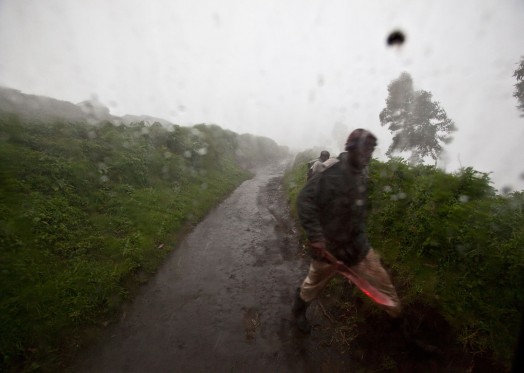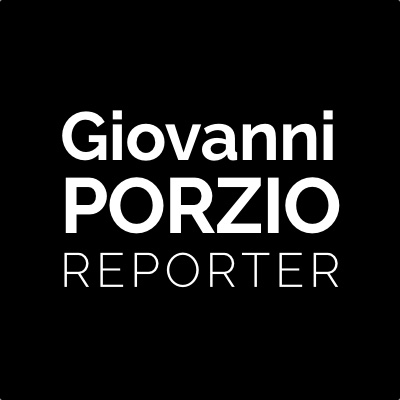Under the Volcanos

Thousands of flickering lamps floating in the hills and down in the valley: at night the miners leave the digging holes and flock to the village, hungrily looking for women, chanvre and cheap liquor. Drunk soldiers roam the muddy streets, girls peep from the shacks, armed youngsters sit on beer boxes outside the dens, porters pull overloaded bikes and shout in the dark. I hear the kids coughing in the IDP camp and gunshots by the riverbanks. Rubaya is a mercyless place, a mining ground on the Masisi range where desperate people shovel tons of coltan and manganese ore and carry it on foot for days to the warehouses in Goma, or smuggle it across the borders of Rwanda and Uganda. It’s a land of high pastures, roaring volcanos and dense forests hunted by gorilla poachers. A beautiful sight if you don’t look too close. But see the MSF health clinic: in the ramshackle wooden shelter TB and cholera patients rub shoulders with pregnant mothers and malnourished babies. Or listen to the frightened motard who just came in from a remote province in the wild west: armed marauders belonging to a local Mai Mai militia stormed his village, burned the huts, abducted the women, used their pangas to randomly chop hands and feet and paraded the enemies’ cut off heads on their spears. And speak with doctor Denis Mukwege at the Panzi Hospital in Bukavu where the fistula specialist surgeon now lives with his family after he escaped an assassination attempt: he tells you stories of unbearable cruelty, of seven years old girls savagely gang raped, mutilated and left to die in the bush; and tells you why he was targeted, after he spoke at the UN denouncing the ongoing strategy of ethnic cleansing through rapes and sexual assaults.
There is no peace in sight in war-torn East Congo: five millions dead in the past 20 years, and counting. Hundred of thousands barely survive in the refugee camps. The 17,000 men MONUSCO blue helmets, the largest deployed UN peace keeping force in the world, don’t seem to make any difference on the ground. Mafia-style politicians, renegade army officers, self appointed coronels and generals, ragtag militiamen and mercenaries carry on unabated with their gory job, paving the way to the plunder of the country’s huge mineral resources. It’s a lucrative business and – save the congolese people – there’s a share for everyone: in Rwanda and Uganda almost 25 per cent of the state budget is due to the illegal mineral trade; Burundi, although it has no mines, is a major gold exporter; bloody diamonds still find their way to the lebanese and israeli comptoirs; the chinese are busy buying everything they can, from timber to copper and zinc; canadian, american, australian, south african and european multinational companies are preying on precious strategic metals like coltan and wolfram. Vast reserves of oil and gas have recently been found in and around the Kivu lake: Big Business is upbeat but it’s not good news for the people here in Goma. The seemingly unlimited mineral riches of the Congo have so far brought misery and hunger on the Great Lakes shores. They will go on fuelling instability and wars for the time to come.





